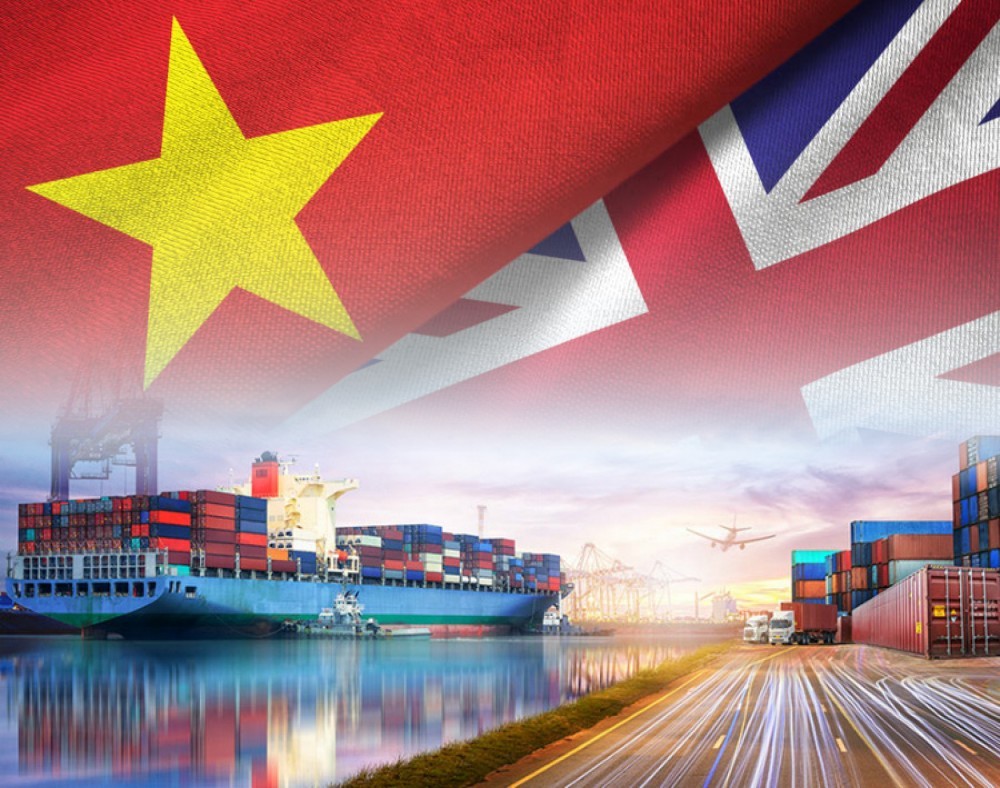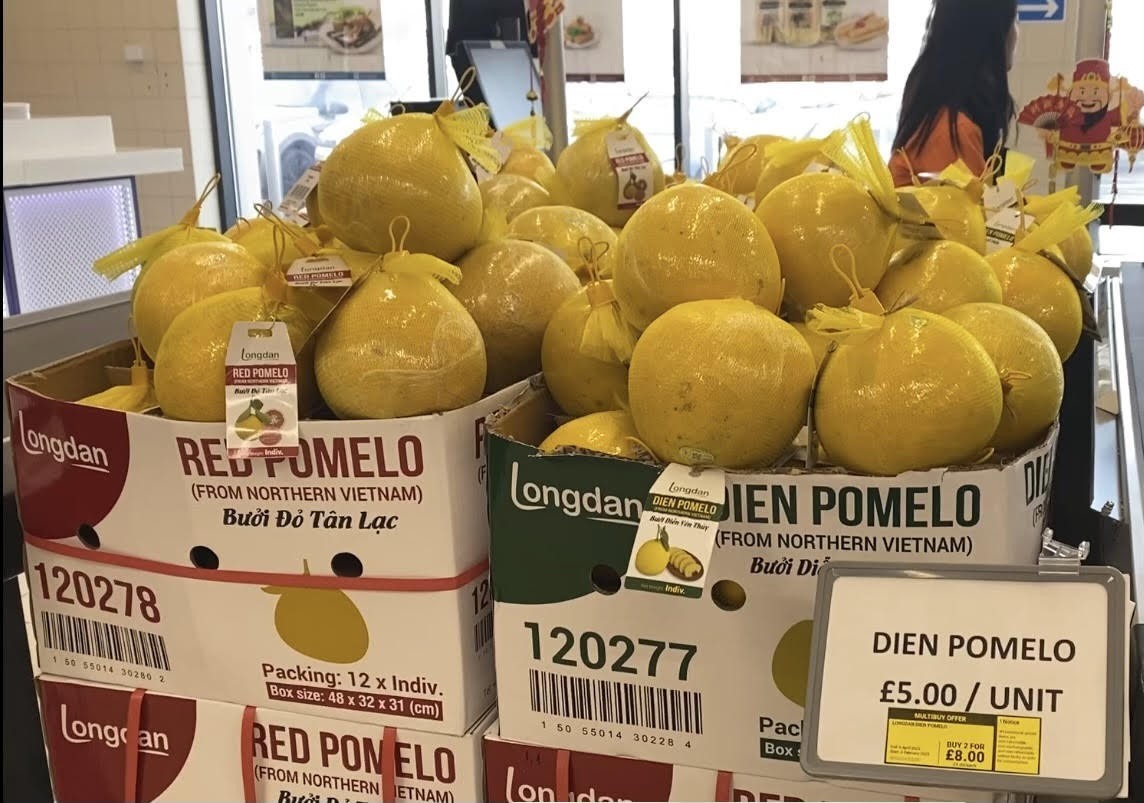
UKVFTA: Helping Vietnamese agricultural products gain competitive advantages and conquer UK market
Latest
 |
| According to the UKVFTA, 94% of the total 547 tariff lines on fruits, vegetables and fruit and vegetable products will be immediately eliminated. (Photo: Industry and Trade Newspaper) |
In early 2024, Vietnam's exports to the UK recorded encouraging results, with export value in January increasing by more than 57% compared to the same period last year. Over the past three years, Vietnam's exports to the UK, particularly agricultural products, have continuously maintained growth, even in 2023 when the UK economy faced high inflation and slow growth.
This achievement is the result of the efforts of businesses and relevant authorities and reflects the benefits of the Vietnam-UK Free Trade Agreement (UKVFTA) since it came into effect in May 2021.
Vietnamese Agricultural Products are popular to the market
In January 2024, according to preliminary statistics from the General Department of Customs of Vietnam, the export value of Vietnamese goods to the UK reached nearly 780.5 million USD, an increase of more than 57% compared to the same period last year, with Vietnam achieving a trade surplus of over 730.9 million USD.
Most export items experienced good growth, especially agricultural products such as coffee, which increased by 218.5%; cashew nuts, up nearly 61%; pepper, more than 60%; fruits and vegetables, over 56%; and seafood, more than 26%.
In 2023, many agricultural exports to the UK also witnessed high growth, such as fruits and vegetables, which increased by nearly 17% (24.3 million USD); cashew nuts, up 13% (nearly 97.8 million USD); and coffee, more than 11% (over 101.1 million USD). The total export value of Vietnam's agricultural, forestry, and fishery products to UK reached more than 770 million USD last year, accounting for over 12% of Vietnam's total export turnover to the UK.
Notably, in 2023, many specialty fruits were exported to the UK for the first time through official channels. Some agricultural food products and fresh fruits have appeared in premium and mid-range supermarket chains in the UK, such as Whole Foods, Marks & Spencer (M&S), and Waitrose.
Ms. Nguyen Thi Thanh Huong, CEO of R.Y.B Joint Stock Company (Hoa Binh), a company specializing in exporting specialty fresh fruits to the UK and Europe, said that in 2023, the fresh fruit products and specialty agricultural products from Hoa Binh province exported to the UK by the company were all sold well and received good feedback from customers. These products include Dien pomelos, Tan Lac red pomelos, green tea, ancient snow tea, black tea, turmeric starch, and cinnamon sticks.
Mr. Thai Tran, CEO of TT Meridian, a company specializing in distributing Vietnamese agricultural products in the UK, mentioned that lychees, green-skinned pomelos, coconuts, mangosteens, pear guavas, passion fruit, and dragon fruit were the items that sold well in the UK over the past year. He believes that these fruits have the potential to compete in this market.
In 2023, TT Meridian exported many new fruit items to the UK, such as durians, lychees, seedless lychees, and pear guavas, to test the market and build the brand for Vietnamese fruits in the UK. The CEO of TT Meridian shared that the fruit and agricultural product business in 2023 brought positive financial results and helped the company expand its market.
Efforts to Expand the Market
Ms. Hoang Le Hang, First Secretary of the Vietnam Trade Office in the UK, said that the export of Vietnamese agricultural products has maintained good growth over the past three years, partly thanks to the implementation of the UKVFTA. According to the agreement, 94% of the total 547 tariff lines on fruits and fruit products were eliminated immediately. This gives many Vietnamese agricultural products a competitive advantage over similar products from countries that do not have a free trade agreement with the UK.
 |
| Dien Grapefruit is available on shelves in UK supermarkets. (Photo: VNA) |
The dynamism and positivity of Vietnamese export enterprises and the Vietnamese business community in the UK, along with the support from the Ministry of Industry and Trade, the Ministry of Agriculture and Rural Development, the Vietnamese Embassy in the UK, and industry associations such as the Vietnam Fruit and Vegetable Association, VICOFA, VASEP, and HAWA, have also contributed to maintaining the achievement of agricultural exports to the UK.
In the past two years, the Trade Promotion Department and the Vietnam Trade Office in the UK have organized many national trade promotion programs, seminars to update information on the UK market, guidance, and business connections. They have also organized booths to introduce the export potential of Vietnamese products at major fairs in the UK specializing in agricultural products and food, such as VEGFEST, Specialty & Fine Food Fair, and Vietnam Goods Week, attracting the participation of many Vietnamese export enterprises and Vietnamese importers in the UK.
Growing Challenges
However, according to Ms. Hoang Le Hang, the export of goods in general and agricultural products in particular will face many challenges in 2024. The Red Sea conflict poses a significant obstacle to shipping goods to the UK by sea, as the journey time has increased by 10-15 days and shipping costs have risen. This will affect the export of agricultural products and fresh fruits in the near future.
Additionally, demand in the UK market has decreased due to economic recession, high inflation, and tighter consumer spending amid rising living costs and concerns about economic uncertainty. The Consumer Confidence Index (CCI) in the UK has consistently been negative in recent months.
Mr. Thai Tran agreed, stating that with the UK economy falling into recession after two consecutive quarters of negative growth and projected to stagnate in 2024, the demand in this market for agricultural products and tropical fruits—which typically have higher prices than temperate fruits—is unlikely to see high growth this year, except for some strong products like dragon fruit, passion fruit, and lychee.
Compliance with UK and European regulations on deforestation and forest degradation prevention, requirements for green certifications and fair trade, and consumer trends for organic and diet-specific products are also factors that require businesses to increase investment, leading to higher production costs and product prices.
Nevertheless, Ms. Hoang Le Hang believes there is still considerable potential for Vietnam to increase agricultural and food exports to the UK, a country that currently imports about 40% of its food demand, including nearly £12.5 billion worth of fruits and vegetables, more than £6 billion of cereals, over £4.8 billion of coffee, tea, and cocoa, and nearly £3.7 billion of seafood. The UK market, with nearly 68 million people, high average income, diverse needs, and an Asian community of more than 5.5 million people, presents opportunities for Vietnamese exporters to exploit.
Additionally, the UK's accession to the Comprehensive and Progressive Agreement for Trans-Pacific Partnership (CPTPP) also creates positive effects, as consumers and distributors in this country show more interest in products from CPTPP member countries, including Vietnam.
Joining Hands to Overcome Difficulties
According to Ms. Hoang Le Hang, to maintain the growth of agricultural exports to the UK, in addition to quality and price factors, producers and exporters need to research and understand market demands. The trend of consuming organic, environmentally friendly products associated with sustainable development is increasingly prevalent in this European country.
Exporting businesses also need to continuously update relevant regulations and policies. Ms. Hoang Le Hang noted this and referenced the UK's new regulation on border control for plants and plant products, known as BTOM.
Accordingly, all plants and plant products imported into the UK must have phytosanitary certification. The requirements for phyto-sanitary certificates vary depending on the type of plant or plant product, while the border control system will include SPS (Sanitary and Phyto-sanitary) mechanisms to control imports not only in cultivation but also for certain types of food.
From April 2024, plant passports will be a mandatory requirement for many types of plants and plant products in the UK and will be digitized for users. The new plant passport system will make it easier for businesses trading in plants and plant products to export.
TT Meridian CEO Thai Tran also believes that the opportunity to expand the market in the UK is significant. However, to compete, especially in today's technological era, businesses need to continuously improve their scientific and technical knowledge in agriculture to produce products that are not only delicious and of stable quality but also have a long shelf life. According to him, the market capacity for Vietnamese agricultural products in the UK largely depends on the shelf life of the products, as distributors are not keen on products with a short shelf life.
Additionally, Vietnamese agricultural products must compete fiercely with those from Thailand, Malaysia, and tropical countries in Latin America and Africa. Therefore, Thai Tran emphasizes that producers and exporters need to pay close attention to price competitiveness, especially in the context of rising sea and air logistics costs due to the Red Sea crisis from the second half of 2023.
The businessman suggests implementing a strategy to build the brand of Vietnamese agricultural products in the UK and encouraging Vietnamese in the UK to support Vietnamese goods to raise awareness of the quality and value of Vietnamese agricultural products. Meanwhile, Ms. Nguyen Thi Thanh Huong believes that there should be promotional programs for Vietnamese agricultural products across the UK.





















